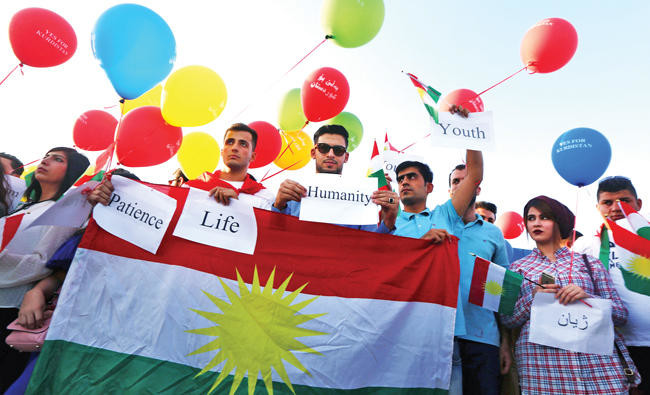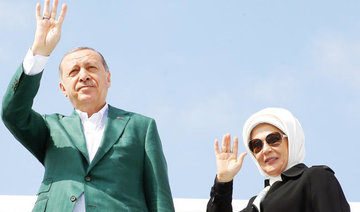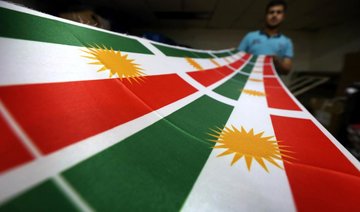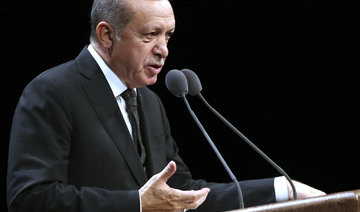ISTANBUL: Turkey’s President Tayyip Erdogan said on Saturday Iraqi Kurdish authorities would pay the price for an independence referendum, which was widely opposed by foreign powers.
Iraq’s Kurds overwhelmingly backed independence in Monday’s referendum, defying neighboring countries which fear the vote could fuel Kurdish separatism within their own borders and lead to fresh conflict.
“They are not forming an independent state, they are opening a wound in the region to twist the knife in,” Erdogan told members of his ruling AK Party in the eastern Turkish city of Erzurum.
“To ignore this reality benefits neither us, nor our Kurdish brothers in Iraq,” he said, calling on Iraqi Kurds to “wake up from this dream” of independence.
Erdogan has built strong commercial ties with Kurdish authorities in northern Iraq, which pump hundreds of thousands of barrels of oil daily through Turkey for export to world markets.
“We don’t regret what we did in the past. But since the conditions are changed and the Kurdish Regional Government (KRG), to which we provided all support, took steps against us, it would pay the price,” he said.
Separately, Erdogan said that Israel’s Mossad intelligence agency played a role in the vote, proved by the waving of Israeli flags during celebrations of the overwhelming “yes’ vote.
During a televised speech, Erdogan claimed that Turkey had been saddened to see some Iraqi Kurds acclaiming the independence referendum with Israeli flags.
“This shows one thing, that this administration (in northern Iraq) has a history with Mossad, they are hand-in-hand together,” Erdogan said in Erzurum, in eastern Turkey.
Israel has been the only country to openly support an independent Kurdish state, with Prime Minister Benjamin Netanyahu backing “the legitimate efforts of the Kurdish people to attain a state of its own.”
Erdogan has derided the Israeli support.
“Are you aware of what you are doing?” Erdogan said in an appeal to Iraqi Kurdish leaders. “Only Israel supports you.”
Ankara has threatened a series of measures to punish Iraqi Kurds, including shutting the land border between Turkey and the region and halting the transit of oil from Iraqi Kurdistan to the southern Turkish port of Ceyhan, an economic lifeline.
On Friday, the Turkish carriers Turkish Airlines, Atlas and Pegasus suspended their flights to Iraqi Kurdistan for an unspecified period of time.
Ankara had previously refused to engage in official contacts with Iraqi Kurds, fearing that any actions that could encourage the creation of an independent Kurdish state could embolden its own Kurds.
But as Turkey’s economy has boomed, Erdogan has moved to forge trade ties with Iraq’s Kurdistan region, helping make Iraq the second-largest market for Turkish exports last year, after Germany.
The Iraqi Kurdish leader Masoud Barzani has also become a frequent visitor to Turkey.
Business sources quoted in Turkish media have warned that the closure of the Habur border gate could harm $7 billion of trade between Ankara and Irbil.
Turkey has repeatedly threatened to impose economic sanction, effectively cutting their main access to international markets, and has held joint military exercises with Iraqi troops on the border.
However, after Erdogan said that Iraqi Kurds would go hungry if Ankara halted the cross-border flow of trucks and oil, it has said that any measures it took would not target civilians and instead focus on those who organized the referendum.
Iraq’s Defense Ministry said on Friday it plans to take control of the borders of the autonomous Kurdistan region in coordination with Iran and Turkey.
Turkish Prime Minister Bin Yildirim, speaking on Saturday, did not refer specifically to those plans, but said Ankara would no longer deal with Kurdish authorities in Irbil.
“From now on, our relationships with the region will be conducted with the central government, Baghdad,” he said. “As Iran, Iraq and Turkey, we work to ensure the games being played in the region will fail.”
Erdogan sees Israel’s hand in Iraqi Kurdistan vote
Erdogan sees Israel’s hand in Iraqi Kurdistan vote

UN experts slam Israel’s blatant assault on health rights in Gaza

- Reiterating charges that Israel is committing genocide in Gaza, two independent UN rights experts said they were “horrified” by the raid last Friday on Kamal Adwan, northern Gaza’s last functioning major hospital
- UN special rapporteurs are independent experts appointed by the UN Human Rights Council but do not speak on behalf of the world body
GENEVA: UN experts have denounced Israel’s raid on an embattled hospital in northern Gaza, demanding an end to the “blatant assault” on health rights in the besieged Palestinian territory.
Reiterating charges that Israel is committing genocide in Gaza, two independent UN rights experts said they were “horrified” by the raid last Friday on Kamal Adwan, northern Gaza’s last functioning major hospital.
“For well over a year into the genocide, Israel’s blatant assault on the right to health in Gaza and the rest of the occupied Palestinian territory is plumbing new depths of impunity,” the experts said.
The joint statement was from Francesca Albanese, the independent UN special rapporteur on the rights situation in the Palestinian territories, and Tlaleng Mofokeng, the special rapporteur on the right to health.
FASTFACT
The joint statement was from Francesca Albanese, the independent UN special rapporteur on the rights situation in the Palestinian territories, and Tlaleng Mofokeng, the special rapporteur on the right to health.
Israel’s diplomatic mission in Geneva dismissed the statement as “far removed from the truth,” saying it “completely ignores critical facts and the broader context of Hamas’s exploitation of civilian infrastructure for military purposes.”
The Israeli military has repeatedly accused Hamas of using hospitals as command centers, something Hamas denies.
The military “undertook every effort to protect civilians,” the Israeli mission said, insisting its “actions highlight Israel’s commitment to international law and the protection of civilian infrastructure, even under the most challenging circumstances.”
Israel’s military said it had killed more than 20 suspected militants and detained more than 240, including the hospital’s director, Hossam Abu Safiyeh, describing him as a suspected Hamas militant.
In their statement, Albanese and Mofokeng said they were “gravely concerned” at Safiyeh’s detention and demanded his “immediate release.”
“Yet another doctor to be harassed, kidnapped, and arbitrarily detained by the occupation forces,” they said.
“This is part of a pattern by Israel to continuously bombard, destroy, and fully annihilate the realization of the right to health in Gaza.”
UN special rapporteurs are independent experts appointed by the UN Human Rights Council but do not speak on behalf of the world body.
The experts also highlighted “disturbing reports” that Israeli forces had allegedly carried out extrajudicial executions of some people near the hospitals, including a Palestinian man reportedly holding a white flag.
They pointed to figures provided by the Health Ministry in Gaza indicating that at least 1,057 Palestinian health and medical professionals have been killed since the war erupted following the Palestinian group’s Oct. 7, 2023 attack inside Israel.
The World Health Organization has repeatedly denounced the high number of attacks on health care staff and facilities in the war: 1,273 attacks on health care in Gaza and the West Bank have been recorded since the start of the war.
WHO chief Tedros Adhanom Ghebreyesus warned on X that the pace of desperately needed medical evacuations out of Gaza was “excruciatingly slow.”
“Only 5,383 patients have been evacuated with support from WHO since October 2023, of which only 436 since the Rafah crossing was closed” last May, he said.
He said more than 12,000 people were awaiting medical evacuation from Gaza.
“At this rate, it would take 5-10 years to evacuate all these critically ill patients, including thousands of children,” he added.
“In the meantime, their conditions get worse and some die.”
Lebanon’s PM discusses with Syria’s de facto ruler relations between two countries

Sharaa also affirmed that Syrian authorities took the necessary measures to restore calm on the border between the two countries, the post on X said.
Syrian foreign minister to visit Qatar, UAE and Jordan this week

CAIRO: Syrian Foreign Minister Asaad Hassan Al-Shibani said in a statement posted on X on Friday that he will visit Qatar, the UAE and Jordan this week to “support stability, security, economic recovery and build distinguished partnerships.”
Lebanese army unit clashes with Syrian gunmen at illegal border crossing

- Interior minister defends additional security measures at airport and land crossing points
BEIRUT: A Lebanese army unit clashed with a group of armed Syrian nationals at the border on Friday as the soldiers attempted to “close an illegal crossing” in the Maarboun-Baalbek area of eastern Lebanon.
The Syrians were trying to forcibly reopen the crossing with a bulldozer, the army said. Soldiers fired warning shots into the air and Syrians responded by returning fire.
The “armed Syrians fired at the Lebanese soldiers, injuring one and sparking a clash between both sides,” the army command added. “Artillery shells were used” and other Lebanese army units in the area also responded with strict military measures, it added.
Subsequently, “reinforcements from the army’s mobile regiment arrived in the area, following the retreat of the armed Syrians, some of whom sustained injuries,” and the illegal crossing remained closed.
Maarboun is a town in Baalbek-Hermel governorate, and a natural crossing point between the two countries. However it is an illegal crossing mainly used by smugglers and human traffickers. The surrounding area is known to be pro-Hezbollah.
The incident at the illegal crossing coincided with the actions of Syrian authorities on Friday morning that prevented hundreds of Lebanese from crossing the border between Masnaa in Lebanon and Jdeidet Yabous in Syria.
The Syrians suddenly imposed new conditions on Lebanese visitors, including requirements that they have a hotel reservation and at least $2,000 in cash. People visiting Syria for surgery or other medical care must now have proof of an appointment and a Syrian sponsor who can confirm their identity. A valid residence permit for the stay in Syria is also required. Lebanese authorities imposed similar rules on Syrians entering Lebanon after the civil war in Syria began more than a decade ago.
Buses carrying Lebanese passengers who intended to visit Syria were forced turn back at the border as a result of the new Syrian rules.
Lebanon’s General Security Directorate decided to “prohibit any Lebanese from entering Syria through illegal crossings between both countries in Bekaa and the north, pending clarity during this stage,” a source from the agency said.
After the fall of President Bashar Assad and his regime in Syria in early December, the directorate held two meetings with officials from the new Syrian administration to discuss the regulation of movement between the two countries.
Though media delegations, politicians and civilians have crossed into Syria in recent days, Lebanese authorities have tightened security at land crossings, following similar actions at Rafic Hariri International Airport in Beirut.
Normal operations at the airport resumed on Friday after an incident on Thursday night involving an aircraft belonging to Iranian airline Mahan Air. Airport security decided to conduct a thorough inspection of all passengers when the plane landed, including luggage belonging to diplomats on board. The diplomats protested and chose instead to leave their luggage at the airport. It was taken to a storage facility for inspection the following day using scanners.
Footage circulated on social media apparently showing young men on motorcycles heading to the airport to protest against the measures. It was believed the heightened security was motivated by concerns that passengers might be carrying money for delivery to Hezbollah. A second Iranian plane that landed on Friday faced similar security measures.
Lebanon’s interior minister, Bassam Mawlawi, described the move as a routine procedure and added: “What the airport security is doing aims to protect Lebanon and the Lebanese people. We are enforcing the law, protecting the airport and safeguarding all of Lebanon because it cannot withstand any new aggression.”
The decision covered the inspection of all luggage, he said, including that carried by diplomats.
The heightened measures drew criticism from the vice president of the Supreme Islamic Shiite Council, Sheikh Ali Al-Khatib. During his Friday sermon, he called on the interior minister “to demonstrate his heroism against the enemy, not against those who made sacrifices to defend Lebanon’s sovereignty.”
Also on Friday, US Maj. Gen. Jasper Jeffers, head of the international committee monitoring the implementation of the ceasefire agreement between the Israeli army and Hezbollah, toured Khiam, where the Lebanese army was deployed after the withdrawal of the Israeli forces. He was accompanied by Brig. Gen. Tony Faris, commander of the Lebanese army’s 7th Brigade.
Their visit came as Israel continued to face criticism for violating Lebanese sovereignty, including reconnaissance flights over southern Lebanon, extending as far as the southern suburbs of Beirut. Israeli forces were also accused of demolishing houses and roads in Dhayra and Jebbayn, and there were renewed warnings to residents of southern Lebanon not to return to homes in border areas until further notice.
There was a heavy presence of UN Interim Force in Lebanon forces along the Bayada-Naqoura road. The Lebanese army has placed concrete barriers on the road to Naqoura, preventing people other than UNIFIL personnel from entering. The UN force’s headquarters is located there.
The Lebanese army said it was surveying military remnants in Naqoura following the withdrawal of Israeli forces from the town on Thursday. When this task is complete, Lebanese forces will be redeployed to the area, it added.
Hamas wants Gaza ceasefire deal as soon as possible, senior official says

- Mediators Qatar, Egypt and the US have been engaged in months of back-and-forth talks between Israel and Hamas
CAIRO: Hamas said a new round of indirect talks on a Gaza ceasefire resumed in Qatar’s Doha on Friday, stressing the group’s seriousness in seeking to reach a deal as soon as possible, senior Hamas official Basem Naim said.
The new talks will focus on agreeing on a permanent ceasefire and the withdrawal of Israeli forces, he added.
Mediators Qatar, Egypt and the US have been engaged in months of back-and-forth talks between Israel and Hamas that have failed to end more than a year of devastating conflict in Gaza.
A key obstacle to a deal has been Israel’s reluctance to agree to a lasting ceasefire.
On Thursday, Prime Minister Benjamin Netanyahu’s office said he had authorized Israeli negotiators to continue talks in Doha.
In December, Qatar expressed optimism that “momentum” was returning to the talks following Donald Trump’s election victory in the United States.
But a war of words then broke out with Hamas accusing Israel of setting “new conditions” while Israel accused Hamas of creating “new obstacles” to a deal.
In its Friday statement, Hamas said it reaffirmed its “seriousness, positivity and commitment to reaching an agreement as soon as possible that meets the aspirations and goals of our steadfast and resilient people.


















